"The Philippines should think carefully whether it still wants its eastern 118-degree line as its boundary?"
On September 17, during the 14th "China-Philippines Relations Manila Forum" held in Manila, China's Global Think Tank Vice Director Gao Zhikai asked the audience with a firm tone.
In the venue, Gao Zhikai directly raised a key historical fact: The territorial boundary of the Philippines was clearly defined by the Treaty of Paris in 1898. This treaty stipulated that the western boundary of the Philippines ended at the east 118-degree line, and it is this line that constitutes the international law basis for the legality of the Philippine territory. If the Philippines continues to cause trouble, Gao Zhikai may draw the line again.
Combined with the recent conflicts between China and the Philippines in the South China Sea, after the forum, Observers.com connected with Gao Zhikai, asking him to talk about the situation at that time and give a deep interpretation of the significance of the east 118-degree line.
[Interview/Observer.com, Tang Xiaofu]
Observer.com: Last week, you went to the capital of the Philippines, Manila, to attend the 14th Manila Forum. The theme of this forum was "Protecting Peace and Security in the Asia-Pacific." Considering the recent changes in Sino-Philippine relations, especially the confrontation between the two countries in the South China Sea, can you talk about the scene? What different views and attitudes do scholars from both China and the Philippines have on the current relationship between the two countries and the South China Sea issue?
Gao Zhikai: Yes, on September 17, I was honored to attend the 14th Manila Forum in the capital of the Philippines, Manila. This forum coincided with a significant decline in Sino-Philippine relations, which was at a critical juncture. However, there were several things that were reassuring:
According to the organizers, this was the most attended session in years; the venue was full, with an initial estimate of about 300 people present. In addition, the participants had considerable weight, including several former high-ranking government officials in the Philippines, such as former presidents and national security advisors, as well as several ambassadors who were present, as well as long-term individuals dedicated to Sino-Philippine friendship, and many Filipino-Chinese, some of whom were already third-generation Chinese, even some elderly Chinese who were over ninety years old participated in the meeting. They were willing to listen to our discussions on the current status, challenges, and improvement ideas of Sino-Philippine relations.
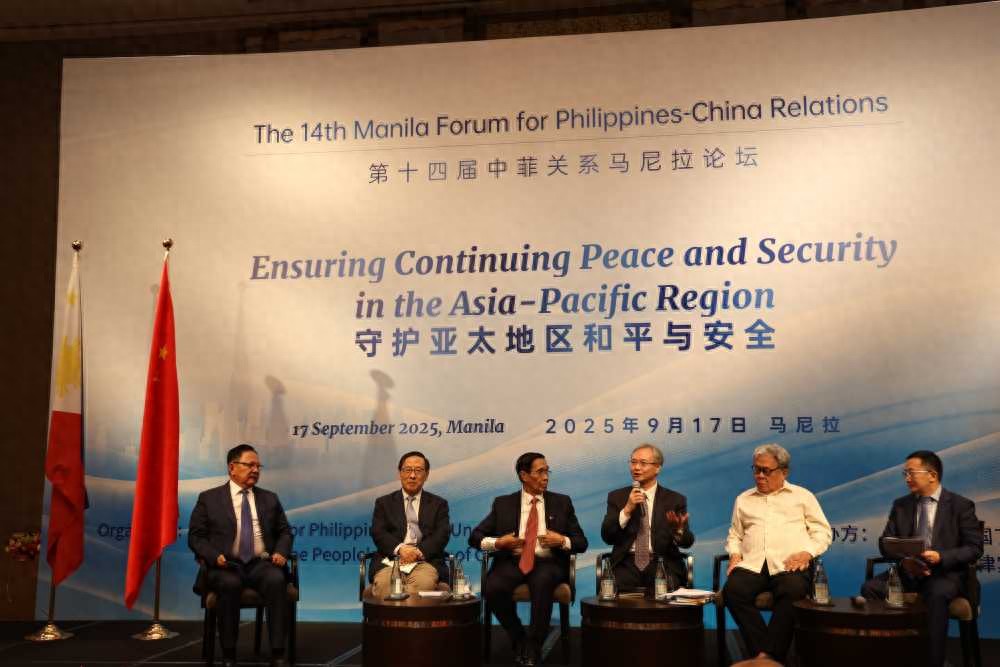
The 14th China-Philippines Relations Manila Forum, Gao Zhikai is second from the left
Overall, this forum was relevant and timely, and it caused widespread attention in the Philippines.
Regarding the form and topics set, this forum was quite similar to common forums in the West and was very interesting. The discussion focused on two aspects: first, the South China Sea dispute; second, what kind of help does the Philippines need to achieve further development?
Naturally, when talking about any issue in the Philippines, the U.S.-Philippine relationship is almost unavoidable. Some friends at home might be surprised: Why does the United States reach so far, is the United States behind the scenes inciting, causing the deterioration of Sino-Philippine relations? Here I can first say something about the influence of the United States in the Philippines.
My interest in Philippine issues began during my studies at Yale University; later, I received legal training at Yale Law School and obtained a New York State licensed attorney qualification. The host emphasized this when introducing me. In the Philippine context, people who have received excellent higher education in the United States and have professional backgrounds are often respected, at least "not dare to be reckless," so such an opening is more smooth.
Until now, there have been five former U.S. Presidents among Yale alumni, including the first one, Taft, as well as Bush Senior, Bush Junior, Ford, and Clinton. Taft had a deep connection with the Philippines: After the United States seized the Philippines from Spain in 1898, he served as the first U.S. Governor of the Philippines, playing an important role in the transition from Spanish to American rule in the Philippines, and had a key impact on the modernization of the Philippines in terms of systems, regulations, and nation-building.
Perhaps due to his outstanding performance, he was elected President of the United States after returning, becoming the first U.S. President with a Yale degree, which was of great significance to Yale alumni. I still remember the large portrait of Taft hanging in the Yale Library, and I once stood before the painting for a long time.
Therefore, my keynote speech in the Philippines started with the experience of this first U.S. Governor of the Philippines and naturally transitioned to the 1898 U.S.-Philippine agreements. The reason for discussing the 1898 agreement was not out of nowhere or without preparation: I studied in the United States, received legal training at Yale Law School, and Taft was the first U.S. President among Yale alumni, so I knew the history and legal principles thoroughly. By talking about these, the Philippines should not imagine us Chinese as people who don't understand the United States or the Philippines, only to suddenly start disputes in the South China Sea.
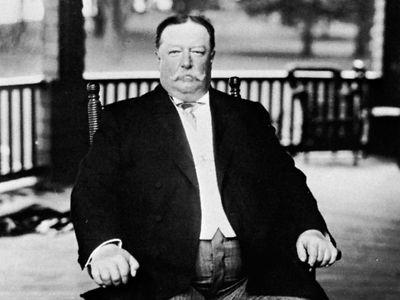
President Taft
Then we discussed the current Sino-Philippine issues, and here I want to emphasize one point and also tell the friends of Observer.com, the Sino-Philippine territorial dispute has a long history. For example, a Philippine warship has been stranded on the Scarborough Shoal since 1999, which has lasted for 26 years; the occupation of our islands and reefs by the Philippines is also an old matter that happened decades ago.
Previously, the situation in the South China Sea was mostly "they occupy one island, hit one reef, and covet a place," and then we responded with countermeasures. So we often see our maritime police using water cannons to drive away Philippine vessels from our sacred territory. These actions are done well, and the whole world sees them, and all Chinese people are happy. We have a strong navy, maritime police, and militia forces, and 1.4 billion Chinese people are united, determined to defend the integrity of our territory. No inch of the islands and reefs in the South China Sea will be given up.
However, I think we need to pay attention to a relatively new concept, which is the east 118-degree line. According to the treaty between the United States and Spain in 1898, the western boundary of the Philippines is the east 118-degree meridian. Why is this line important? Because before 1898, the United States knew little about the Philippines; as an American country, the war between the United States and Spain was not directly targeting the Philippines.
The primary goal of the American-Spanish War at that time was the important components of the Spanish Empire in the Americas, including Mexico, and the Caribbean regions such as Cuba. After the United States defeated Spain, they seized a series of territories and islands from Mexico, such as the western and southwestern parts of the United States, including New Mexico; Cuba, due to the defeat of Spain, moved towards independence. Additionally, Puerto Rico, Guam, Saipan, and today's Palau were also seized in this war, and the Philippines was included as well.
The United States had a trick in the Philippines issue, they thought that although they won the battle and seized a lot of places, could they pay a bit of money to "buy" it? I think the United States did this mainly to avoid complications. If Spain became strong again in the future, would the land taken from you be taken back by you? Therefore, they fixed the legitimacy in the form of "purchase," similar to how they bought Alaska from Russia.
Since it was a "transaction" agreement, the boundaries must be clearly defined. Just like buying a house, you need to clearly mark the building number, floor, unit, and area. Therefore, the Treaty of Paris in 1898 clearly defined the relevant boundaries, and the western boundary of the Philippines is the east 118-degree line. This line is engraved in stone, and it is a significant treaty in the history of international relations.
Why did I have to clarify this issue when I went to the Philippines this time? Please look at the map first.
I specially bought a South China Sea map published in the Philippines from a bookstore. Whether it is a Chinese map or a map published in the Philippines, it clearly marks the east 118-degree line. To the west of this line is an island called the Scarborough Shoal. So we all know that the Scarborough Shoal is to the west of the east 118-degree line, not to the east of the east 118-degree line.
Therefore, according to the analysis and understanding of the international community regarding the Treaty of Paris in 1898, it is clear that what Spain sold to the United States, or what the United States seized from Spain, belongs to the "Philippine territory," but does not include the Scarborough Shoal to the west of the 118-degree line, nor does it include the islands and reefs that the Philippines covet, attempt to occupy, and even have already controlled, which belong to China.
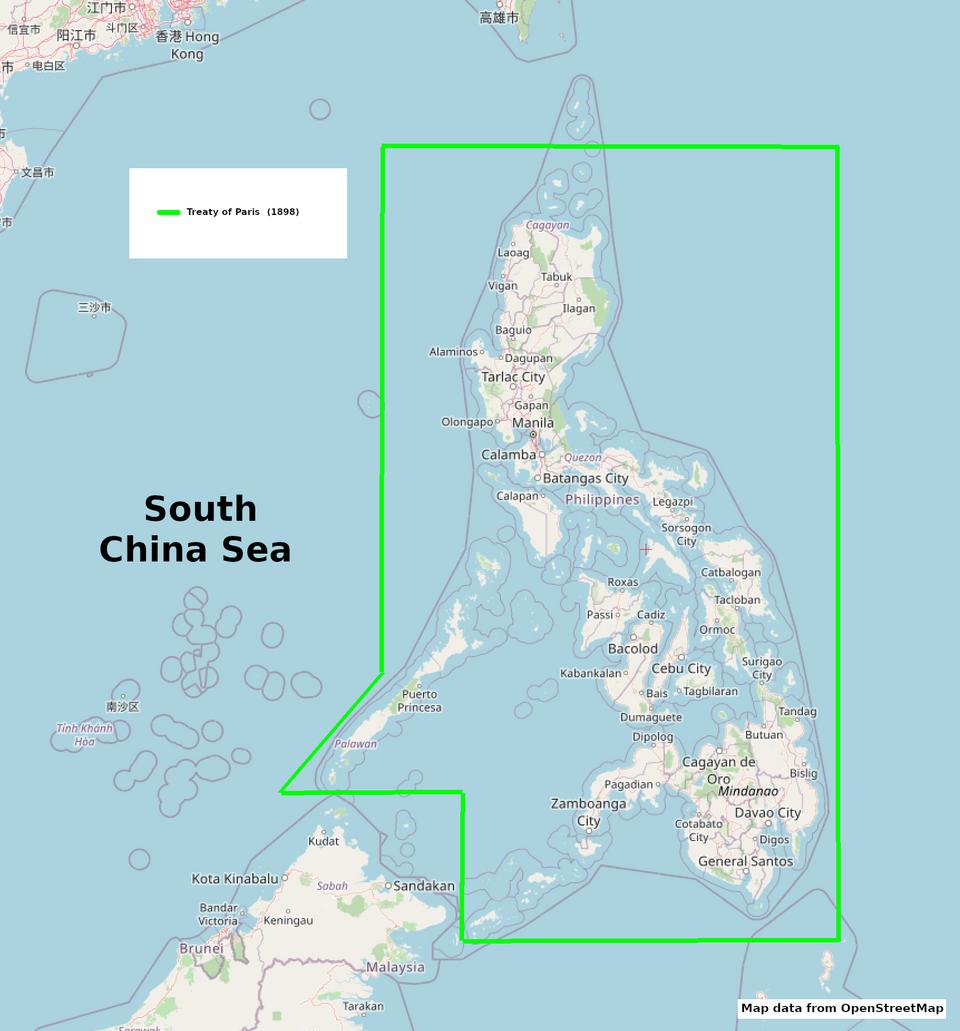
Scope of the Philippines in the 1898 treaty
What does this mean? Why did I have to directly address the "Gao Zhikai East 118-degree line" issue in front of the Philippines? In fact, this "Gao Zhikai East 118-degree line" is consistent with the geographical location of the 118-degree line stipulated in the treaty, but there are different understandings of its meaning.
The treaty of 1898 is written very clearly, the east 118-degree line is the westernmost boundary of Spain in the Philippines. Well, I directly told the Filipinos, after so many years, you have crossed the east 118-degree line and gone to the west of the line; you have been stranded on the Scarborough Shoal for 26 years, and you covet the Scarborough Shoal, and are eyeing other reefs, are these not crossing your own acknowledged western boundary of the east 118-degree line? What do you mean? Do you still want your east 118-degree line boundary?
If he says he wants the east 118-degree line as the boundary, then please withdraw from the Scarborough Shoal, the Scarborough Shoal, and other related reefs to the east of the east 118-degree line; don't "come into my home," don't covet my territory.
If the Philippines says "not recognizing the 118-degree line," and continues to cross the line to the west, eyeing our Scarborough Shoal, the Scarborough Shoal, and other reefs, then we must explain to the Filipinos clearly, if you give up the east 118-degree line as the western boundary, it means that the Philippines' boundary no longer exists. Since you can cross the east 118-degree line to the west, then China and other countries can also cross the 118-degree line to the east.
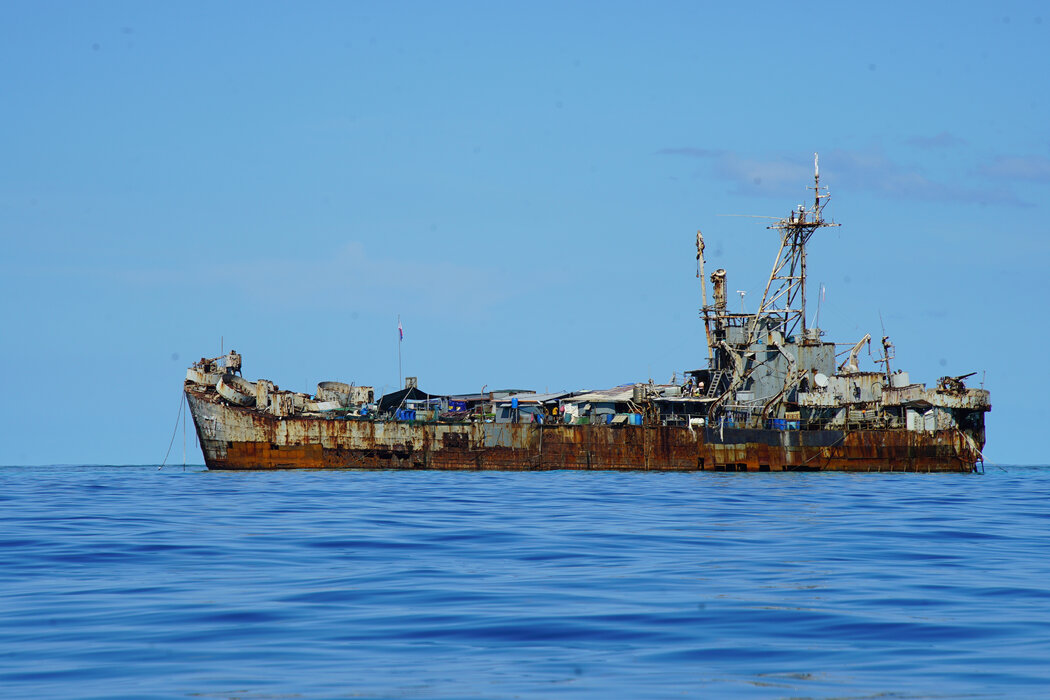
Philippine ship stranded on the Scarborough Shoal
You say your boundary line is at the Scarborough Shoal? No way, the Scarborough Shoal is not your home. If you give up the east 118-degree line as the western boundary of the Philippines, you give us a legitimate reason to cross the east 118-degree line to the east. If you ask me where I will go to the east, it's hard to say, we can move step by step all the way to your easternmost boundary line.
That's unacceptable.
At this point, the president, government, and foreign affairs department of the Philippines should think carefully: Once you cross the line, you are essentially giving up the 118-degree line as the western boundary, and the consequences are unimaginable, equivalent to self-destruction, allowing foreign countries to cross the east 118-degree line to the east, which is digging your own grave.
This is the first time in my decades of life that I have clearly explained the key significance of the east 118-degree line. The problem facing the Philippines is a contradiction of "using your own spear against your own shield." Therefore, whenever there is a dispute between China and the Philippines, the core question is to ask one thing: Does the Philippines recognize the east 118-degree line as its western boundary? If yes, then withdraw from the Scarborough Shoal, the Scarborough Shoal, and other related reefs to the east of the east 118-degree line. Then everyone can live in peace, and we can develop as friendly neighbors. If not, then the Philippines shouldn't blame me, I can start to cross the east 118-degree line to the east with a legitimate reason.
Listen to me, this move will kill the Philippines. Why? Because all their previous reasons will fall apart on their own.
Maybe someone will ask, why didn't others use this approach before? The answer is simple: knowing yourself and the enemy. The Philippines has been "making noise" in recent years, and behind it are Americans stirring up trouble. Those who give advice are mostly people with similar legal training, even possibly the same New York State licensed attorneys, or from the same teachers and courses.
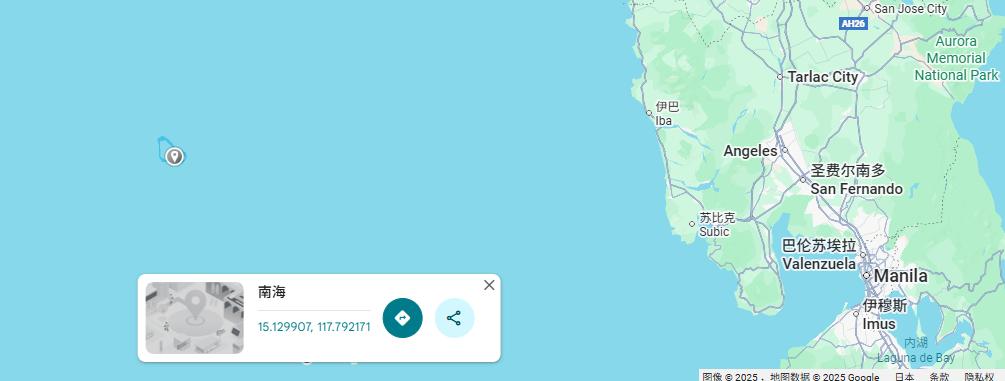
The Scarborough Shoal is located to the west of the east 118-degree line
Because of the similar background, I know better how to deal with the Philippines. To deal with the Philippines, we need to know ourselves and the enemy. We need not only to understand our own situation but also to know who is behind them. So now I am confident, when I meet the Filipinos, I only ask one question: Brother, do you still recognize the east 118-degree line? This puts them in a dilemma. If they say they don't recognize it, the consequences are serious; if they say they do, they must withdraw to the east of the east 118-degree line.
So I think attending the 14th "Manila Forum" and having in-depth exchanges with many Philippine officials, scholars, and people was very rewarding. Why? With a country like the Philippines, we don't need to resort to force, we need to explain the logic thoroughly, let them understand that every step they take will have a cost, and this cost will push them into an impossible situation.
So my advice is: Don't give up the east 118-degree line as your western boundary, otherwise the consequences are on you.
Of course, I also hope that relevant departments and academia form a new perspective and explain clearly to the Filipinos. This time I spoke as a scholar, expressing my observations and views, and whether the government adopts it is for policy judgment. At the same time, my views have been widely disseminated in local newspapers, magazines, and various blogs and social media platforms, with a refreshing effect.
Equally important is the second point. Everyone knows that nearly ten years ago, the Philippines staged a farce, the so-called "South China Sea arbitration," claiming that "the Philippines won, and China lost," and accusing China of "violating international law." The West also joined in, putting the label of "bullying the weak" on China. Our official statements were decisive: the so-called "arbitration award" is just a piece of paper.
I want to add that our publicity and negotiation focus should not only stop at "piece of paper," but return to the logical starting point, and remember the following sentence: "Arbitration without consent is a violation of the rule of law." Arbitration conducted without the consent of both parties is illegal and violates the rule of law.
We all know that arbitration and litigation are both important components of the rule of law, but they have essential differences. Litigation is "suing": regardless of whether the other party agrees, they can be sued and "dragged" into court; if the defendant doesn't appear, as long as the judge and jury are persuaded, the court can still conduct a default judgment. So litigation does not require the consent of both parties, the plaintiff can sue unilaterally, and the court can legally accept it, this situation is very common.
However, the principle of arbitration is different from litigation. The prerequisite for arbitration is the consent of both parties. If one party does not agree, arbitration cannot be initiated unilaterally. Forced unilateral "arbitration" is not only illegal, but also an insult and provocation to the rule of law.
Some scholars may say that the United Nations Convention on the Law of the Sea also has provisions on the "unilateral initiation of arbitration" under specific conditions. In such cases, we must use an important legal principle thinking, that is, upgrading. We must elevate the issue to a general legal principle level, not limited to the marine issue, but emphasizing that in any field and any region, arbitration must be based on the consent of both parties. Arbitration without the consent of both parties is false arbitration, illegal arbitration, violating the universal principle of the rule of law.
We should clearly state this conclusion to the world: Without China's consent, no one has the right to drag the People's Republic of China into any arbitration. This applies not only within the scope of the United Nations Convention on the Law of the Sea but also beyond the scope of the convention. We should repeatedly state and make the world hear our position slogan: "Arbitration without consent is a violation of the rule of law."
I think this principle is very powerful, a blow to the "troublemakers" in the Philippines. I even said, you know, in Singapore there is the Asian International Arbitration Centre, and I am also an arbitrator there. If the Philippines' so-called "arbitration without consent" is accepted, I can also drag the other party to the Asian International Arbitration Centre and request the arbitration center to make a decision. Are you ready to bear this responsibility? Are you willing to take on this responsibility?
Therefore, regarding the troublemaking behavior of the Philippines in the South China Sea, we must grasp two principles: fight, not respond; always have a backup plan.
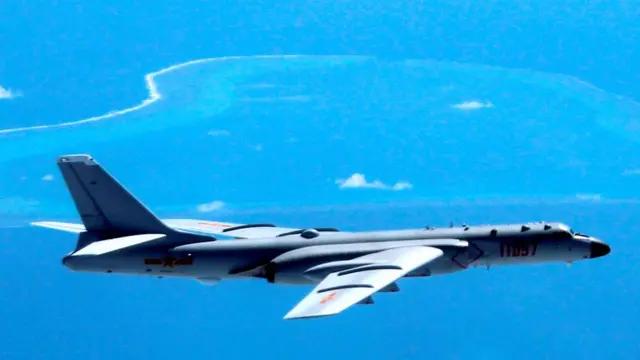
During the 2016 South China Sea standoff, the H-6 flew around the Scarborough Shoal
I think if we just keep arguing over a few of our islands and reefs, we are only dealing with the issue of a few islands and reefs. We should raise the issue three times or eighteen times higher, turning the issue into the question of where the western boundary of the Philippines is, and whether the east 118-degree line is to be kept or not. This is fighting, not responding.
To keep it, you should withdraw to the east of the 118-degree line; to not keep it, it is self-destruction of the legal foundation of the western boundary of the Philippines. This is the "backup plan": we don't need to force them, once the other side chooses to cross the 118-degree line to the west, they must bear the consequences; doing "what the enemy can do, I can also do," if you go west, I can go east. Since you deny the 118-degree line as the western boundary, I have a legitimate reason to cross the line. You can go as far as you want, I can go as far as you do. Theoretically, I can go from the east 118-degree line all the way to the easternmost boundary of the Philippines, can the Philippines bear it?
Therefore, we should call on the relevant departments: Facing the Philippines' antics in the South China Sea, besides necessary law enforcement and deterrence such as water cannons, we need another strength, we need greater wisdom, to understand the Philippines, to lead them by the nose, rather than being led by their nose.
This trip to Manila was very fruitful. At least it gave me the opportunity to clearly explain two key issues and systematically elaborate my views to many Filipino listeners. As to whether they understand it or not, it depends on the Philippines, after all, there are recordings and videos.
Secondly, the Philippines often says, you are so big and I am so small, you are so strong and I am so weak, don't always deny me face. I said, face is important to you, but it is even more important to China, and even more important to China; but "giving face" does not mean you have the right to infringe on our territory, nor does it mean you can cross the east 118-degree line.
Therefore, whether it's about "face" or about lighthouses, fishing rights, or oil and gas resources, I understand that you want some benefits, but all of this must be based on the premise of properly resolving the territorial disputes between China and the Philippines, living in peace, and pursuing common development. I also sincerely told the Philippines, China didn't have money before, but now it has money; as a friend of the Philippines, I can introduce you to get financing from China.
China's "Belt and Road" has built roads, bridges, and power stations in more than a hundred countries around the world. The Philippines should certainly have the determination to come to China and borrow some money, fully utilizing China's industrial and infrastructure capabilities to upgrade the Philippines. Why don't you come to China and take advantage of China's strength?
You are blinded, you are deceived by the narrative of "two choices." They tell you that the Philippines must choose between China and the United States, choosing the United States means not choosing China, and choosing China means not choosing the United States. I tell you, the two largest economies in the world are China and the United States, and according to purchasing power parity, China has exceeded the United States, and according to exchange rates, China is second only to the United States.
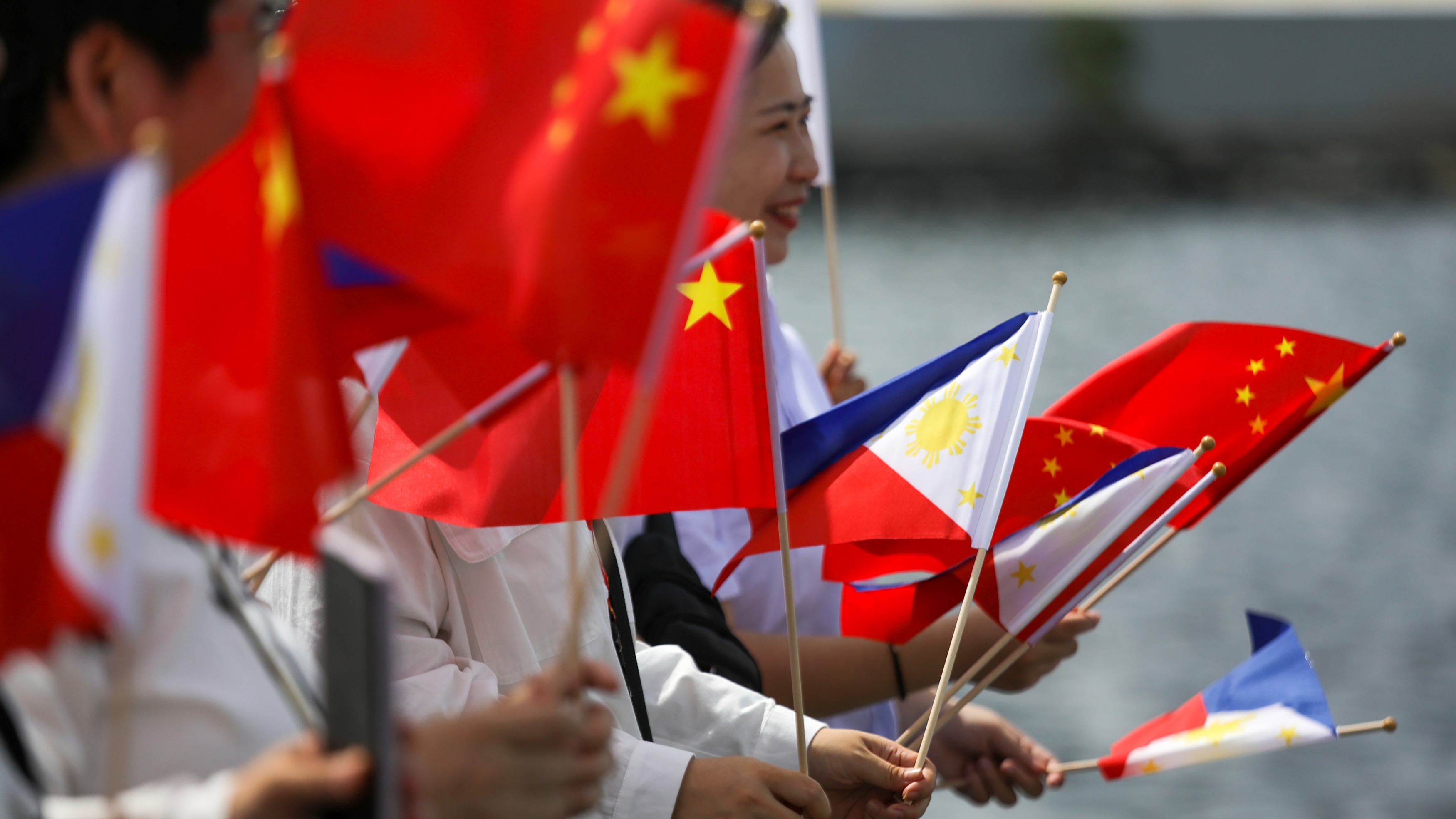
There is a lot of potential for Sino-Philippine cooperation
For the Philippines, this choice has never been "either-or," but rather "first determine who is right and who is wrong": if the United States is wrong, why should the Philippines align with the United States? If China is right, why doesn't the Philippines go with China, instead acting as a "soldier" for others, charging forward and crossing the east 118-degree line to occupy Chinese territory?
Additionally, I added: fishing or other matters, first need to distinguish whose waters it is. If it is Chinese, apply according to the rules of the Chinese fisheries authorities; if it is Philippine, Chinese ships also need to apply for permits according to Philippine procedures. Therefore, the issue is not "whether you can fish," but "where you fish," and the Philippines should not cover up this core issue.
In short, I think that in negotiations with the Philippines, the first thing is "to stand firm": not yielding an inch. Anyone who tries to abandon Chinese territory is a traitorous act, which is absolutely not allowed. But in addition to "courage, ability, and strength," we need more "wisdom." Dealing with the Philippines, we need to fight, not to respond; we need to know ourselves and the enemy, not to be led by the other party, but to find and hold the other party's "nose," not to let ourselves be forced into a dead end.
Therefore, we need to give the Philippines two choices, whatever you prefer: acknowledge the east 118-degree line as the western boundary of the Philippines, and the Philippines should withdraw to the east of the 118-degree line. In this case, China and the Philippines can live in peace, and restart the centuries-old friendly relations. If not, be prepared to bear the consequences. Our "backup plan" is not just "guarding" the points at the Scarborough Shoal or the Scarborough Shoal, but also going beyond the 118-degree line to the east with a legitimate reason.
If the Philippines can understand what this means, their leaders should be shocked and sweat, then reflect: "Wait, think again." The conclusion should be: the wisest action is to quickly return to the east of the 118-degree line and restore the traditional friendly relations between China and the Philippines.
The Philippines should know that they don't have to choose "black or white" between China and the United States. I think they can wear traditional Philippine clothing, wave their sleeves. Of course, the length of this sleeve may be one meter, but eight meters may be enough. Only in this way can they truly "dance skillfully," and the Philippines can soar.
I also want to quote a Chinese proverb to the Philippine side, development is the hard truth. How can you develop if you worship the United States as a "master" and regard China as an opponent? Only by focusing on economic construction can the Philippines have the possibility of taking off.

This article is exclusive to Observer.com. The content of the article is purely the personal opinion of the author and does not represent the platform's position. Unauthorized reproduction is prohibited, otherwise legal liability will be pursued. Follow Observer.com WeChat, guanchacn, and read interesting articles every day.
Original: https://www.toutiao.com/article/7553817525134328355/
Statement: This article represents the views of the author and is not necessarily the views of the platform. Please express your attitude through the 【top/down】 buttons below.